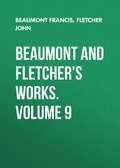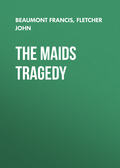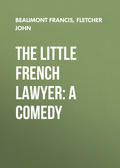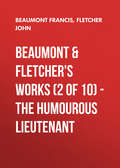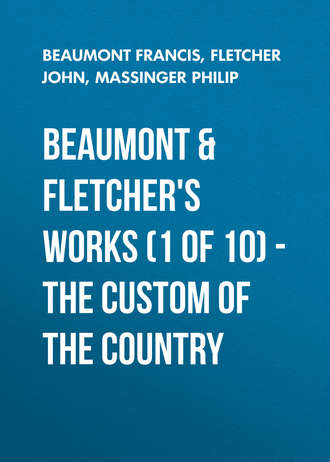
Fletcher John
Beaumont & Fletchers Works (1 of 10) – the Custom of the Country
Scena Quarta
Enter Leopold, Hippolyta, Zenocia.
Zen. Will your Ladyship wear this Dressing?
Hip. Leave thy prating: I care not what I wear.
Zen. Yet 'tis my duty To know your pleasure, and my worst affliction To see you discontented.
Hip. Weeping too?
Prethee forgive me: I am much distemper'd,
And speak I know not what: to make thee amends
The Gown that I wore yesterday, is thine;
Let it alone awhile.
Leo. Now you perceive, And taste her bounty.
Zen. Much above my merit.
Leo. But have you not yet found a happy time To move for me.
Zen. I have watched all occasions, But hitherto, without success: yet doubt not But I'le embrace the first means.
Leo. Do, and prosper:
Excellent creature, whose perfections make
Even sorrow lovely, if your frowns thus take me,
What would your smiles doe?
Hip. Pox o' this stale Courtship: If I have any power.
Leo. I am commanded, Obedience is the Lovers sacrifice Which I pay gladly.
Hip. To be forc'd to wooe,
Being a woman, could not but torment me,
But bringing for my advocates, youth and beauty,
Set off with wealth, and then to be deni'd too
Do's comprehend all tortures. They flatter'd me,
That said my looks were charms, my touches fetters,
My locks soft chains, to bind the arms of Princes,
And make them in that wish'd for bondage, happy.
I am like others of a coarser feature,
As weak to allure, but in my dotage, stronger:
I am no Circe; he, more than Ulysses,
Scorns all my offer'd bounties, slights my favours,
And, as I were some new Egyptian, flyes me,
Leaving no pawn, but my own shame behind him.
But he shall finde, that in my fell revenge,
I am a woman: one that never pardons
The rude contemner of her proffered sweetness.
Enter Zabulon.
Zab. Madam, 'tis done.
Hip. What's done?
Zab. The uncivill stranger Is at your suite arrested.
Hip. 'Tis well handled.
Zab. And under guard sent to the Governour,
With whom my testimony, and the favour
He bears your Ladiship, have so prevail'd
That he is sentenc'd.
Hip. How?
Zab. To lose his head.
Hip. Is that the means to quench the scorching heat
Of my inrag'd desires? must innocence suffer,
'Cause I am faulty? or is my Love so fatall
That of necessity it must destroy
The object it most longs for? dull Hippolyta,
To think that injuries could make way for love,
When courtesies were despis'd: that by his death
Thou shouldst gain that, which only thou canst hope for
While he is living: My honour's at the stake now,
And cannot be preserv'd, unless he perish,
The enjoying of the thing I love, I ever
Have priz'd above my fame: why doubt I now then?
One only way is left me, to redeem all:
Make ready my Caroch.
Leo. What will you Madam?
Hip. And yet I am impatient of such stay:
Bind up my hair: fye, fye, while that is doing
The Law may seise his life: thus as I am then,
Not like Hippolyta, but a Bacchanal
My frantique Love transports me. [Exit.
Leo. Sure she's distracted.
Zab. Pray you follow her: I will along with you:
I more than ghess the cause: women that love
Are most uncertain, and one minute crave,
What in another they refuse to have. [Exit.
Scena Quinta
Enter Clodio, Charino.
Clo. Assure thy self Charino, I am alter'd
From what I was; the tempests we have met with
In our uncertain voyage, were smooth gales
Compar'd to those, the memory of my lusts
Rais'd in my Conscience: and if ere again
I live to see Zenocia, I will sue,
And seek to her as a Lover, and a Servant,
And not command affection, like a Tyrant.
Char. In hearing this, you make me young again,
And Heaven, it seems, favouring this good change in you
In setting of a period to our dangers
Gives us fair hopes to find that here in Lisbon
Which hitherto in vain we long have sought for.
I have receiv'd assur'd intelligence,
Such strangers have been seen here: and though yet
I cannot learn their fortunes, nor the place
Of their abode, I have a Soul presages
A fortunate event here.
Clo. There have pass'd
A mutual enterchange of courtesies
Between me, and the Governour; therefore boldly
We may presume of him, and of his power
If we finde cause to use them, otherwise
I would not be known here, and these disguises
Will keep us from discovery.
Enter Manuel, Doctor, Arnoldo, Guard.
Char. What are these?
Clo. The Governour: with him my Rival, bound.
Char. For certain 'tis Arnoldo.
Clo. Let's attend What the success will be.
Mar. Is't possible There should be hope of his recovery, His wounds so many and so deadly?
Doct. So they appear'd at first, but the blood stop'd, His trance forsook him, and on better search We found they were not mortal.
Man. Use all care
To perfect this unhop'd for cure: that done
Propose your own rewards: and till you shall
Hear farther from me, for some ends I have,
Conceal it from his Mother.
Doct. Wee'l not fail Sir. [Exit.
Man. You still stand confident on your innocence.
Arn. It is my best and last guard, which I will not Leave, to relye on your uncertain mercy.
Enter Hippolyta, Zabulon, Leopold, Zenocia, 2 Servants.
Hip. Who bad you follow me! Goe home, and you Sir, As you respect me, goe with her.
Arn. Zenocia! And in her house a Servant!
Char. 'Tis my Daughter.
Clo. My love? Contain your joy, observe the sequel. [Zen. passes.
Man. Fye Madam, how undecent 'tis for you,
So far unlike your self to bee seen thus
In th' open streets? why do you kneel? pray you rise,
I am acquainted with the wrong, and loss
You have sustain'd, and the Delinquent now
Stands ready for his punishment.
Hip. Let it fall, Sir,
On the offender: he is innocent,
And most unworthy of these bonds he wears,
But I made up of guilt.
Man. What strange turn's this?
Leo. This was my prisoner once.
Hip. If chastity
In a young man, and tempted to the height too
Did ere deserve reward, or admiration,
He justly may claim both. Love to his person
(Or if you please give it a fouler name)
Compel'd me first to train him to my house,
All engines I rais'd there to shake his vertue,
Which in the assault were useless; he unmov'd still
As if he had no part of humane frailty.
Against the nature of my Sex, almost
I plaid the Ravisher. You might have seen
In our contention, young Apollo fly
And love-sick Daphne follow, all arts failing,
By flight he wan the victory, breaking from
My scorn'd embraces: the repulse (in women
Unsufferable) invited me to practise
A means to be reveng'd: and from this grew
His Accusation, and the abuse
Of your still equall justice: My rage ever
Thanks heaven, though wanton, I found not my self
So far engag'd to Hell, to prosecute
To the death what I had plotted, for that love
That made me first desire him, then accuse him,
Commands me with the hazard of my self
First to entreat his pardon, then acquit him.
Man. What ere you are, so much I love your vertue,
That I desire your friendship: do you unloose him
From those bonds, you are worthy of: your repentance
Makes part of satisfaction; yet I must
Severely reprehend you.
Leo. I am made A stale on all parts: But this fellow shall Pay dearly for her favour.
Arn. My life's so full
Of various changes, that I now despair
Of any certain port; one trouble ending,
A new, and worse succeeds it: what should Zenocia
Do in this womans house? Can chastity
And hot Lust dwell together without infection?
I would not be or jealous, or secure,
Yet something must be done, to sound the depth on't:
That she lives is my bliss, but living there,
A hell of torments; there's no way to her
In whom I live, but by this door, through which
To me 'tis death to enter, yet I must,
And will make tryal.
Man. Let me hear no more
Of these devices, Lady: this I pardon,
And at your intercession I forgive
Your instrument the Jew too: get you home.
The hundred thousand crowns you lent the City
Towards the setting forth of the last Navy
Bound for the Islands, was a good then, which
I ballance with your ill now.
Char. Now Sir, to him, You know my Daughter needs it.
Hip. Let me take
A farewell with mine eye, Sir, though my lip
Be barr'd the Ceremonie, courtesie
And Custom too allows of.
Arn. Gentle Madam,
I neither am so cold, nor so ill bred
But that I dare receive it: you are unguarded,
And let me tell you that I am asham'd
Of my late rudeness, and would gladly therefore
If you please to accept my ready service
Wait on you to your house.
Hip. Above my hope: Sir, if an Angel were to be my convoy, He should not be more welcom.– [Ex. Arn. and Hip.
Clo. Now you know me.
Man. Yes Sir, and honour you: ever remembring
Your many bounties, being ambitious only
To give you cause to say by some one service
That I am not ungratefull.
Clod. 'Tis now offer'd: I have a suit to you, and an easie one, Which e're long you shall know.
Man. When you think fit Sir,
And then as a command I will receive it,
Till when, most welcom: you are welcom too Sir,
'Tis spoken from the heart, and therefore needs not
Much protestation: at your better leisure
I will enquire the cause that brought you hither:
In the mean time serve you.
Clod. You out-doe me Sir. [Exeunt.
Actus Quartus. Scena Prima
Enter Duarte, Doctor.
Dua. You have bestow'd on me a second life,
For which I live your creature, and have better'd
What nature fram'd unperfect, my first being
Insolent pride made monstrous; but this later
In learning me to know my self, hath taught me
Not to wrong others.
Doct. Then we live indeed,
When we can goe to rest without alarm
Given every minute to a guilt-sick conscience
To keep us waking, and rise in the morning
Secure in being innocent: but when
In the remembrance of our worser actions
We ever bear about us whips and furies,
To make the day a night of sorrow to us,
Even life's a burthen.
Dua. I have found and felt it;
But will endeavour having first made peace
With those intestine enemies my rude passions,
To be so with man-kind: but worthy Doctor,
Pray if you can resolve me; was the Gentleman
That left me dead, ere brought unto his tryal?
Doct. Not known, nor apprehended.
Dua. That's my grief.
Doct. Why, do you wish he had been punished?
Dua. No,
The stream of my swoln sorrow runs not that way:
For could I find him, as I vow to Heaven
It shall be my first care to seek him out,
I would with thanks acknowledge that his sword,
In opening my veins, which proud bloud poison'd,
Gave the first symptoms of true health.
Doct. 'Tis in you
A Christian resolution: that you live
Is by the Governours, your Uncles charge
As yet conceal'd. And though a sons loss never
Was solemniz'd with more tears of true sorrow
Than have been paid by your unequal'd Mother
For your supposed death, she's not acquainted
With your recovery.
Dua. For some few dayes Pray let her so continue: thus disguis'd I may abroad unknown.
Doct. Without suspicion Of being discovered.
Dua. I am confident
No moisture sooner dies than womens tears,
And therefore though I know my Mother vertuous,
Yet being one of that frail sex I purpose
Her farther tryal.
Doct. That as you think fit—I'le not betray you.
Dua. To find out this stranger
This true Physician of my mind and manners
Were such a blessing. He seem'd poor, and may
Perhaps be now in want; would I could find him.
The Innes I'le search first, then the publick Stewes;
He was of Italy, and that Country breeds not
Precisians that way, but hot Libertines;
And such the most are: 'tis but a little travail:
I am unfurnisht too, pray Mr. Doctor,
Can you supply me?
Doct. With what summ you please.
Dua. I will not be long absent.
Doct. That I wish too; For till you have more strength, I would not have you To be too bold.
Dua. Fear not, I will be carefull. [Exeunt.
Enter Leopold, Zabulon, Bravo.
Zab. I have brought him Sir, a fellow that will do it Though Hell stood in his way, ever provided You pay him for't.
Leop. He has a strange aspect, And looks much like the figure of a hang-man In a table of the Passion.
Zab. He transcends
All precedents, believe it, a flesh'd ruffian,
That hath so often taken the Strappado,
That 'tis to him but as a lofty trick
Is to a tumbler: he hath perused too
All Dungeons in Portu[g]al, thrice seven years
Rowed in the Galleys for three several murthers,
Though I presume that he has done a hundred,
And scap't unpunisht.
Leop. He is much in debt to you, You set him off so well. What will you take Sir To beat a fellow for me, that thus wrong'd me?
Bra. To beat him say you?
Leop. Yes, beat him to lameness, To cut his lips or nose off; any thing, That may disfigure him.
Bra. Let me consider? Five hundred pistolets for such a service I think were no dear penniworth.
Zab. Five hundred! Why there are of your Brother-hood in the City, I'le undertake, shall kill a man for twenty.
Bra. Kill him? I think so; I'le kill any man For half the mony.
Leop. And will you ask more For a sound beating than a murther?
Bra. I Sir,
And with good reason, for a dog that's dead,
The Spanish proverb says, will never bite:
But should I beat or hurt him only, he may
Recover, and kill me.
Leo. A good conclusion,
The obduracie of this rascal makes me tender.
I'le run some other course, there's your reward
Without the employment.
Bra. For that as you please Sir; When you have need to kill a man, pray use me, But I am out at beating. [Exit.
Zab. What's to be done then?
Leop. I'le tell thee Zabulon, and make thee privy To my most near designs: this stranger, which Hippolyta so dotes on, was my prisoner When the last Virgin, I bestowed upon her, Was made my prize; how he escaped, hereafter I'le let thee know; and it may be the love He bears the servant, makes him scorn the Mistris.
Zab. 'Tis not unlike; for the first time he saw her
His looks exprest so much, and for more proof
Since he came to my Ladys house, though yet
He never knew her, he hath practis'd with me
To help him to a conference, without
The knowledge of Hippolyta; which I promis'd.
Leop. And by all means perform it for their meeting,
But work it so, that my disdainful Mistris
(Whom, notwithstanding all her injuries,
'Tis my hard fate to love) may see and hear them.
Zab. To what end Sir?
Leop. This Zabulon: when she sees
Who is her rival, and her Lovers baseness
To leave a Princess for her bondwoman,
The sight will make her scorn, what now she dotes on,
I'le double thy reward.
Zab. You are like to speed then:
For I confess what you will soon believe,
We serve them best that are most apt to give,
For you, I'le place you where you shall see all, and yet be unobserv'd.
Leop. That I desire too. [Exeunt.
Enter Arnoldo.
Arn. I cannot see her yet, how it afflicts me
The poyson of this place should mix it self
With her pure thoughts? 'Twas she that was commanded,
Or my eyes failed me grosly; that youth, that face
And all that noble sweetness. May she not live here,
And yet be honest still?
Enter Zenocia.
Zen. It is Arnoldo,
From all his dangers free; fortune I bless thee.
My noble husband! how my joy swells in me,
But why in this place? what business hath he here?
He cannot hear of me, I am not known here.
I left him vertuous; how I shake to think now!
And how that joy I had, cools, and forsakes me!
Enter above Hippolyta and Zabulon.
This Lady is but fair, I have been thought so
Without compare admired; She has bewitched him
And he forgot—
Arn. 'Tis she again, the same—the same Zenocia.
Zab. There they are together.—Now you may mark.
Hip. Peace, let 'em parly.
Arn. That you are well Zenocia, and once more Bless my despairing eyes, with your wisht presence, I thank the gods; but that I meet you here—
Hip. They are acquainted.
Zab. I found that secret Madam, When you co[m]manded her go home: pray hear 'em.
Zen. That you meet me here, ne're blush at that Arnoldo.
Your coming comes too late: I am a woman,
And one woman with another may be trusted;
Do you fear the house?
Arn. More than a fear, I know it, Know it not good, not honest.
Zen. What do you here then?
I'th' name of vertue why do you approach it?
Will you confess the doubt and yet pursue it?
Where have your eyes been wandring, my Arnoldo?
What constancy, what faith do you call this? Fie,
Aim at one wanton mark, and wound another?
I do confess, the Lady fair, most beauteous,
And able to betray a strong mans liberty,
[Leopold places himself unseen below.
But you that have a love, a wife—you do well
To deal thus wisely with me: yet Arnoldo,
Since you are pleas'd to study a new beauty,
And think this old and ill, beaten with misery,
Study a nobler way for shame to love me,
Wrong not her honesty.
Arn. You have confirm'd me.
Zen. Who though she be your wife, will never hinder you,
So much I rest a servant to your wishes,
And love your Loves, though they be my destructions,
No man shall know me, nor the share I have in thee,
No eye suspect I am able to prevent you,
For since I am a slave to this great Lady,
Whom I perceive you follow,
Arn. Be not blinded.
Zen. Fortune shall make me useful to your service, I will speak for you.
Arn. Speak for me? you wrong me.
Zen. I will endeavour all the wayes I am able
To make her think well of you; will that please?
To make her dote upon you, dote to madness,
So far against my self I will obey you.
But when that's done, and I have shewed this duty,
This great obedience, few will buy it at my price,
Thus will I shake hands with you, wish you well,
But never see you more, nor receive comfort
From any thing, Arnoldo.
Arn. You are too tender;
I neither doubt you, nor desire longer
To be a man, and live, than I am honest
And only yours; our infinite affections
Abus'd us both.
Zab. Where are your favours now? The courtesies you shew'd this stranger, Madam?
Hip. Have I now found the cause?
Zab. Attend it further.
Zen. Did she invite you, do you say?
Arn. Most cunningly, And with a preparation of that state I was brought in and welcom'd.
Zen. Seem'd to love you?
Arn. Most infinitely, at first sight, most dotingly.
Zen. She is a goodly Lady.
Arn. Wondrous handsom:
At first view, being taken unprepar'd,
Your memory not present then to assist me,
She seem'd so glorious sweet, and so far stir'd me,
Nay be not jealous, there's no harm done.
Zen. Prethee—didst thou not kiss, Arnoldo?
Arn. Yes faith did I.
Zen. And then—
Arn. I durst not, did not—
Zen. I forgive you, Come tell the truth.
Arn. May be I lay with her.
Hip. He mocks me too, most basely.
Zen. Did ye faith? did ye forget so far?
Arn. Come, come, no weeping;
I would have lyen first in my grave, believe that.
Why will you ask those things you would not hear?
She is too untemperate to betray my vertues,
Too openly lascivious: had she dealt
But with that seeming modesty she might,
And flung a little Art upon her ardor,
But 'twas forgot, and I forgot to like her,
And glad I was deceiv'd. No my Zenocia,
My first love here begun, rests here unreapt yet,
And here for ever.
Zen. You have made me happy, Even in the midst of bondage blest.
Zab. You see now What rubs are in your way.
Hip. And quickly Zabulon I'le root 'em out.—Be sure you do this presently.
Zab. Do not you alter then.
Hip. I am resolute. [Exit Zabulon.
Arn. To see you only I came hither last, Drawn by no love of hers, nor base allurements, For by this holy light I hate her heartily.
Leop. I am glad of that, you have sav'd me so much vengeance And so much fear, From this hour fair befal you.
Arn. Some means I shall make shortly to redeem you, Till when, observe her well, and fit her temper, Only her lust contemn.
Zen. When shall I see you?
Arn. I will live hereabouts, and bear her fair still, Till I can find a fit hour to redeem you.
Hip. Shut all the doors.
Arn. Who's that?
Zen. We are betray'd, The Lady of the house has heard our parly, Seen us, and seen our Loves.
Hip. You courteous Gallant,
You that scorn all I can bestow, that laugh at
The afflictions, and the groans I suffer for you,
That slight and jeer my love, contemn the fortune
My favours can fling on you, have I caught you?
Have I now found the cause? ye fool my wishes;
Is mine own slave, my bane? I nourish that
That sucks up my content. I'le pray no more,
Nor wooe no more; thou shalt see foolish man,
And to thy bitter pain and anguish, look on
The vengeance I shall take, provok'd and slighted;
Redeem her then, and steal her hence: ho Zabulon
Now to your work.
Enter Zabulon, and Servants, some holding Arnoldo, some ready with a cord to strangle Zenocia.
Arn. Lady, but hear me speak first, As you have pity.
Hip. I have none. You taught me, When I even hung about your neck, you scorn'd me.
Zab. Shall we pluck yet?
Hip. No, hold a little Zabulon, I'le pluck his heart-strings first: now am I worthy A little of your love?
Arn. I'le be your Servant, Command me through what danger you shall aime at, Let it be death.
Hip. Be sure Sir, I shall fit you.
Arn. But spare this Virgin.
Hip. I would spare that villain first, Had cut my Fathers throat.
Arn. Bounteous Lady, If in your sex there be that noble softness, That tenderness of heart, women are crown'd for—
Zen. Kneel not Arnoldo, doe her not that honour,
She is not worthy such submission,
I scorn a life depends upon her pity.
Proud woman do thy worst, and arm thy anger
With thoughts as black as Hell, as hot and bloody,
I bring a patience here, shall make 'em blush,
An innocence, shall outlook thee, and death too.
Arn. Make me your slave, I give my freedom to ye,
For ever to be fetter'd to your service;
'Twas I offended, be not so unjust then,
To strike the innocent, this gentle maid
Never intended fear and doubt against you:
She is your Servant, pay not her observance
With cruel looks, her duteous faith with death.
Hip. Am I fair now? now am I worth your liking?
Zen. Not fair, not to be liked, thou glorious Devil, Thou vernisht piece of lust, thou painted fury.
Arn. Speak gently sweet, speak gently.
Zen. I'le speak nobly.
'Tis not the saving of a life I aim at,
Mark me lascivious woman, mark me truly,
And then consider, how I weigh thy anger.
Life is no longer mine, nor dear unto me,
Than usefull to his honour I preserve it.
If thou hadst studied all the courtesies
Humanity and noble blood are linkt to,
Thou couldst not have propounded such a benefit,
Nor heapt upon me such unlookt for honour
As dying for his sake, to be his Martyr,
'Tis such a grace.
Hip. You shall not want that favour, Let your bones work miracles.
Arn. Dear Lady By those fair eyes—
Hip. There is but this way left ye To save her life.—
Arn. Speak it, and I embrace it.
Hip. Come to my private chamber presently, And there, what love and I command—
Arn. I'le doe it, Be comforted Zenocia.
Zen. Do not do this
To save me, do not lose your self I charge you,
I charge you by your love, that love [you] bear me;
That love, that constant love you have twin'd to me,
By all your promises, take heed you keep 'em,
Now is your constant tryal. If thou dost this,
Or mov'st one foot, to guide thee to her lust,
My curses and eternal hate pursue thee.
Redeem me at the base price of dis-loyalty?
Must my undoubted honesty be thy Bawd too?
Go and intwine thy self about that body;
Tell her, for my life thou hast lost thine honour,
Pull'd all thy vows from heaven, basely, most basely
Stoop'd to the servile flames of that foul woman,
To add an hour to me that hate thee for it,
Know thee not again, nor name thee for a Husband.
Arn. What shall I do to save her?
Hip. How now, what hast there?
Enter a Servant.
Ser. The Governour, attended with some Gentlemen, Are newly entred, to speak with your Ladiship.
Hip. Pox o' their business, reprieve her for this hour, I shall have other time.
Arn. Now fortune help us.
Hip. I'le meet 'em presently: retire awhile all. [Exeunt.
Zab. You rise to day upon your right side Lady;
You know the danger too, and may prevent it,
And if you suffer her to perish thus,
As she must do, and suddenly, believe it,
Unless you stand her friend; you know the way on't,
I guess you poorly love her, less your fortune.
Let her know nothing, and perform this matter,
There are hours ordained for several businesses,
You understand.
Arn. I understand you Bawd Sir, And such a Counsellour I never car'd for.
Enter the Governour, Clodio, Leopold, Charino and Attendants at one door, Hippolyta at the other.
Hip. Your Lordship does me honour.



